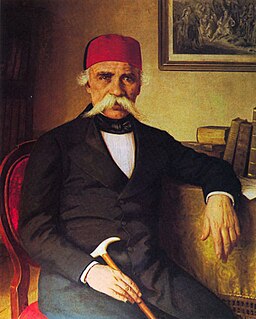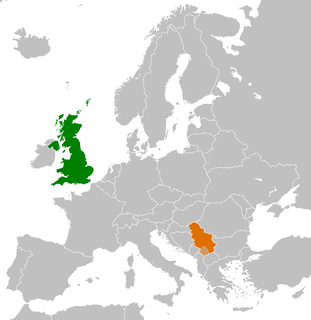
Vuk Stefanović Karadžić was a Serbian philologist and linguist. He was one of the most important reformers of the modern Serbian language. For his collection and preservation of Serbian folktales, Encyclopædia Britannica labelled him "the father of Serbian folk-literature scholarship." He was also the author of the first Serbian dictionary in the new reformed language. In addition, he translated the New Testament into the reformed form of the Serbian spelling and language.
Maleševci is a historical Serbian tribe and region in Old Herzegovina that existed in the Late Middle Ages.
Serbian literature, refers to literature written in Serbian language and/or in Serbia and all other lands where Serbs reside.

Slobodan Jovanović was a Serbian historian, lawyer, philosopher, literary critic and politician, and one of the most prominent intellectuals of his time. He was the professor at the University of Belgrade Faculty of Law (1897—1940), Rector of the University of Belgrade, and the President of the Serbian Royal Academy (1928–1931). He took part at the Paris Peace Conference (1919) as an expert for the Yugoslav Government.

Prvoslav Vujcic is a Serbian Canadian writer, poet, translator, columnist and aphorist. He has been described as one of the most prominent writers of Serbian origin.

British – Serbian relations are foreign relations between the United Kingdom and Serbia. Both countries established diplomatic relations in 1837. The UK has an embassy and consulate in Belgrade and Serbia has an embassy in London. The Serbian ambassador to the United Kingdom is Dr Dejan Popovic and the British ambassador to Serbia is Denis Keefe.

Stojan Novaković was a Serbian politician, historian, diplomat, writer, bibliographer, literary critic, literary historian, and translator. He held the post of Prime Minister of the Kingdom of Serbia on two occasions, post of minister of education on three occasions, minister of interior on one occasion and leading the foremost liberal political party of that time in Serbia, the Progressive Party. He was also one of the most successful and skilled Serbian diplomats, holding the post of envoy to Constantinople, Paris, Vienna and Saint Petersburg.

Revolutionary Serbia or Karađorđe's Serbia refers to the state established by Serbian revolutionaries in Ottoman Serbia after successful military operations against the Ottoman Empire and establishment of government in 1805. The Sublime Porte first officially recognized the state as autonomous in January 1807, however, the Serbian revolutionaries rejected the treaty and continued fighting the Ottomans until 1813. Although the first uprising was crushed, it was followed by the Second Serbian Uprising in 1815, which resulted in the creation of the Principality of Serbia, as it gained semi-independence from the Ottoman Empire in 1817.
Medieval Serbian literature or Old Serbian literature refers to the literature of the Medieval Serbian state, written in Old Serbian.

Đorđe Marković Koder was a Serbian poet born in Austrian Empire. Misunderstood, largely forgotten and often considered a marginal figure in Serbian poetry, criticized for his cryptic style littered with incomprehensible words and obscure metaphors, Koder was nevertheless a unique phenomenon in the 19th century Serbian literature, sometimes cited as the first Serbian modernist.
Radovan Samardžić was a Yugoslav and Serbian historian, member of the Serbian Academy of Sciences and Arts (SANU).

The Army of the Kingdom of Serbia, known in English as the Royal Serbian Army, was the army of the Kingdom of Serbia that existed between 1882 and 1918, succeeding the Armed forces of the Principality of Serbia and preceding the Royal Yugoslav Army.
Hieromonk Pahomije was a Serbian Orthodox hieromonk and one of the first printers of books in the Serbian language. He learned his printing skills from Hieromonk Makarije at the Crnojević printing house in the period of 1494–96. In 1518 he accepted the invitation of Božidar Vuković and went to Venice where he organized printing at the Vuković printing house in the period of 1519/1520–21.

The Mileševa printing house was a printing house established in 1544 in the Mileševa monastery near Prijepolje, Ottoman Empire. Three srbulje books were printed in this printing house. Two in 1544 and 1545 and one in 1557.

Vojislav V. Jovanović is a Serbian novelist and writer of short stories, prose and poems.

South Serbia was a province (pokrajina) of the Kingdom of Serbs, Croats and Slovenes that existed between 1919 and 1922. It encompassed the modern territories of Sandžak, Kosovo and North Macedonia. The term "Old Serbia", was historically used in Serbian politics, literature and science for the territories of the province. The term continued in use for the Vardar Banovina and Zeta Banovina following its disestablishment.

Pavle Popović was a Serbian literary critic and historian, a professor and rector at the University of Belgrade. He is the brother of Bogdan Popović, also a well-known and equally influential literary critic and university professor.

Jevrem Grujić ; was a Serbian lawyer, politician and diplomat in the mid to late 19th Century. Grujić was active at the highest levels of Serbian politics, contributing to the creation of new laws and a member of multiple cabinets. As a prominent ideologue of Serbian liberalism and member of the Academy of Sciences and Arts, he was frequently in conflict with the absolutist regime of Prince Mihailo Obrenović. Imprisoned a number of times during his career, popular support resulted in Grujić's release.












